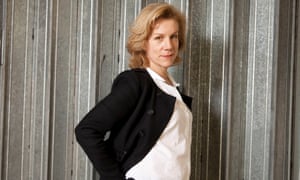The UK is facing a once in a generation challenge in the way it deals with the refugee crisis and the response of its politicians and the public will be judged by history, according to actor Juliet Stevenson.
Stevenson, who has campaigned for the rights of refugees and migrants for more than 25 years said the arrival in Europe of hundreds of thousands of people fleeing war, poverty and persecution in the past 12 months had raised fundamental questions about the kind of country the UK wants to be.
“Finally, people are realising that what is going on at the moment is a movement in history, it is not just a news item,” said Stevenson. “It is not going to stop and we need to remember that we do live in a country that has a very proud tradition of opening our doors to people in extreme cases of humanitarian need ... It is time now to identify ourselves again as a nation that does respond as compassionate human beings.”
The actor first became involved in the rights of refugees in the 1990s and is currently campaigning for funds to allow her local refugee centre to open more days each week. She said politicians had repeatedly failed to rise to the challenge of helping and protecting people whose lives had been devastated by war and persecution, but added the outpouring of public support in recent weeks had been inspiring.
Stevenson said: “What I have been so encouraged by is that millions of people in this country have been moved, have been reached on an individual and collective level by what is happening ... it is about our identity as individuals and as a nation.”
Theresa May, the home secretary, increased anti-immigrant rhetoric in a speech to the Conservative party conference earlier this month that was described as “thoroughly chilling” by the Refugee Council and “irresponsible” by the Institute of Directors.
Stevenson said that May, who outlined measures to limit asylum applications, was typical of those Conservative politicians who had little understanding or empathy for people who found their lives turned upside down by war or persecution. “I hope David Cameron wakes up and realises that he is on the wrong side of history ... he does not represent our point of view, we are not who you say we are, you do not speak for us.”
Almost a third of people in the UK have personally backed the refugee relief effort in the last month, according to a recent opinion poll on the crisis, and Stevenson said the public were shaming politicians. “History will judge us and our response to this crisis,” she said. Many people feel ashamed to be in a country where we say we will only take 20,000 people over five years ... your house is being bombed this week, you are living in a refugee camp where typhoid is rife – it is no good to say we will come back in five years.”
Stevenson is campaigning to raise funds for the Islington Centre for Refugees and Migrants which was forced to open just one day each week from last month due to funding cuts. It offers a range of services from classes in English, dance and art to advice and support as well as food and clothes.
So far the appeal has raised £15,000 and if donations continue the centre hopes to hit its £30,000 target by Christmas, which would allow the centre to open for a second day each week from January 2016. Stevenson said: “It does wonderful important work and offers a place of safety and security to people who have neither, whose entire lives have been shattered.”
She has made a film about the centre and said it was crucial members of the public supported it and similar groups around the country. “This is one of many similar centres around the country that are struggling to survive with no government support at a time when they are needed more than ever,” she said. “It is a microcosm of a huge story that is unfolding in towns and cities up and down the country.”

View all comments >
comments
Sign in or create your Guardian account to join the discussion.
This discussion is closed for comments.
We’re doing some maintenance right now. You can still read comments, but please come back later to add your own.
Commenting has been disabled for this account (why?)